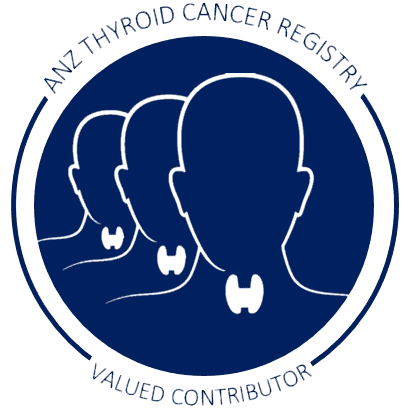Thyroid cancer is less common than many other cancers. The risk of developing thyroid cancer before the age of 75 is 1 in 250 for men and 1 in 97 for women. Fortunately the prognosis of thyroid cancer is excellent with overall survival rates of 97% following treatment.
Cancer develops when abnormal cells grow in an unregulated fashion. There are several types of thyroid cancer:
Papillary thyroid cancer is the most common type ( 70-80%) and is a slow growing cancer. It may spread to the local lymph nodes around the thyroid although this does not usually worsen outcome. Treatment is surgery and in some cases radioactive iodine.
Follicular thyroid cancer (and the rare subtype Hurthle cell cancer) makes up approximately 25% of all thyroid cancers. This does not usually spread to the lymph nodes. Treatment is with surgery and in some cases radioactive iodine.
Medullary thyroid cancer comes from the parafollicular thyroid cells (or C cells). It is rare, only 4% of all thyroid cancer. It can run in families and be associated with a genetic mutation. It can spread to the lymph nodes. Treatment involves thyroidectomy and often lymph node dissection. Radioactive iodine is not indicated for medullary cancer.
Anaplastic cancer is very rare (1%) and fast growing. It can develop from undiagnosed papillary or follicular cancer.
Thyroid lymphoma is rare and usually treated with chemotherapy rather than surgery.
Symptoms of thyroid cancer
The following are some of the symptoms of thyroid cancer. Many thyroid cancers do not produce symptoms and are detected by a doctor or picked up incidentally on imaging when other conditions are being investigated. The symptoms listed below are more often caused by benign (noncancerous) conditions. If you notice any of the following it is best to see your doctor for further investigation.
A painless lump in the neck, particularly if it is enlarging.
Difficulty with breathing or swallowing
Feeling of a lump in the throat
Change or hoarseness of voice
Swollen lymph nodes in the neck
Cancers do not usually affect the production of thyroid hormones.
More information can be found in Understanding Thyroid Cancer by Cancer Council Australia
ThyCa: Thyroid Cancer Survivors' Association
Both Dr Gough and Dr Stringer are contributors to the Australian and New Zealand Thyroid cancer Registry.

